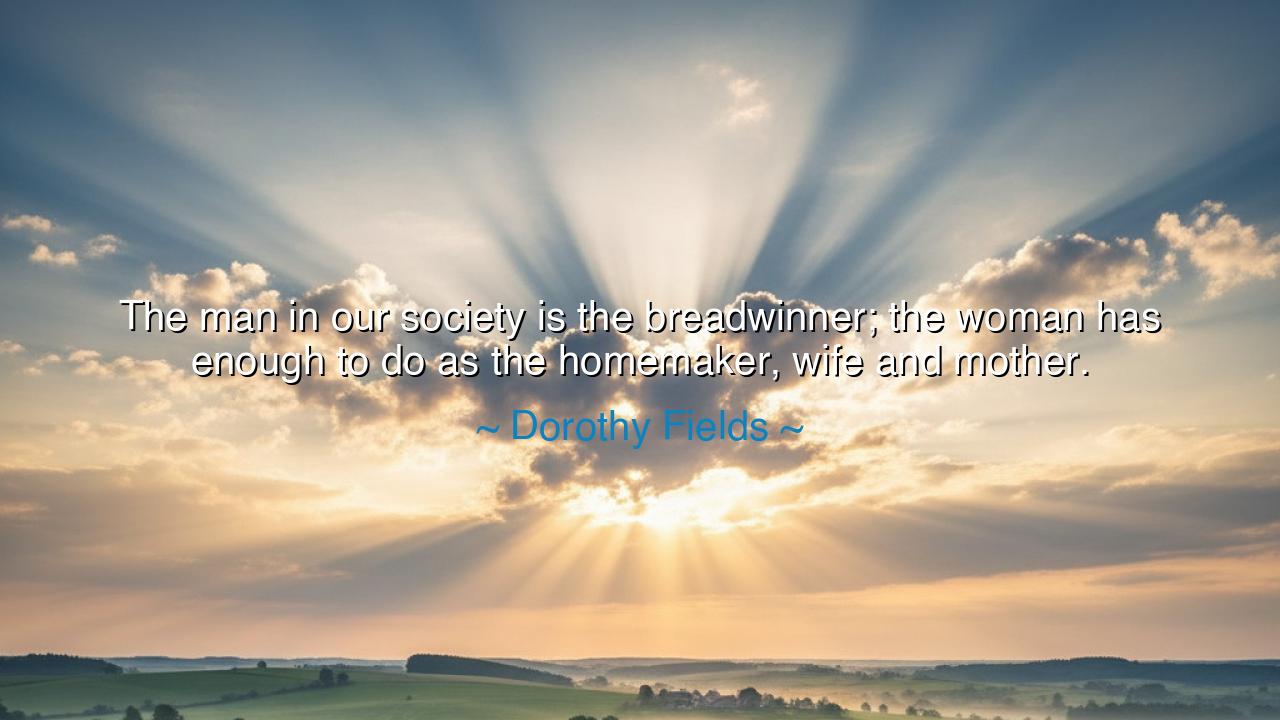
The man in our society is the breadwinner; the woman has enough
The man in our society is the breadwinner; the woman has enough to do as the homemaker, wife and mother.






In the reflective and grounded words of Dorothy Fields, “The man in our society is the breadwinner; the woman has enough to do as the homemaker, wife and mother,” we hear the voice of a bygone age—an age in which duty, structure, and sacrifice formed the pillars of family life. Yet beyond the surface of tradition, her words speak to a deeper truth: the sacred balance of roles that hold civilization together. Fields, a lyricist and writer of great insight, was not simply describing the social order of her time; she was acknowledging the immense, often unseen labor of women—the emotional, spiritual, and physical work that sustains home, heart, and humanity.
The origin of this quote lies in an era when society was built upon defined roles—when the man’s strength was measured by his labor, and the woman’s by her endurance and grace. Dorothy Fields, who herself defied convention as a successful woman in the male-dominated world of Broadway and film, understood the tension between societal expectation and personal ambition. Her statement was not born of limitation, but of recognition—that the homemaker’s role, so often dismissed as lesser, was in truth a full and sacred calling. For to be a wife, a mother, a keeper of the home, is to be both the silent architect of order and the guardian of the flame that warms the soul of every generation.
The ancients too revered this balance. In the households of Greece and Rome, the man was the public face, the warrior or merchant; but the woman was the heart, the weaver of life’s continuity. The goddess Hestia, who ruled over the hearth, was never seen in the myths traveling to war or holding court among gods—yet every prayer began and ended with her name, for she represented the peace, warmth, and stability of home. Without her, the warrior’s victory would be empty, the merchant’s wealth meaningless. Fields’ words echo this eternal truth: that though the man may bring the bread, it is the woman who makes it sacred through love, through nourishment, through the alchemy of care.
Consider the life of Eleanor Roosevelt, who transformed her role as wife and mother into a beacon of social reform and moral strength. Though her husband, Franklin D. Roosevelt, was the “breadwinner” of the nation, she became its conscience. She carried the spirit of homemaking into the realm of politics, nurturing justice, compassion, and unity. In her, we see the embodiment of what Dorothy Fields implied—the woman’s labor, though rooted in home, expands outward, shaping families, communities, and nations. Her home was not bounded by walls, but by the reach of her heart. And through her, we see that homemaking, in its truest sense, is the art of cultivating life wherever one stands.
Fields’ quote may sound old-fashioned to modern ears, yet its essence remains powerful. It reminds us that the labor of love—the emotional work, the teaching of values, the quiet holding of chaos—is not secondary to worldly achievement. The woman who tends her home with purpose builds the moral foundation upon which civilizations rise. The man who works to provide, when moved by love and respect for that labor, fulfills the sacred balance of partnership. Both are stewards of creation—each bearing the weight of a world the other cannot carry alone.
Yet, time and change have taught us that these roles are not chains, but symbols—symbols that can evolve while their spirit endures. In our age, where women stand as leaders, creators, and innovators, and men as nurturers and healers, Fields’ words can be read anew: not as a prescription, but as a recognition of mutual devotion. What matters is not who earns or who tends, but that both work in love, each honoring the other’s burden, each keeping the sacred hearth of life alive. The essence of her wisdom lies not in gender, but in gratitude—for every unseen effort, for every quiet act of care that sustains the world.
Let this truth be handed down as a lesson for all generations: honor the work that sustains life, whether it is done in the marketplace or the home. Respect the invisible labor that keeps the heart of the world beating. Whether one’s duty is to provide or to nurture, both paths are divine when walked with purpose and love. The true measure of society is not in its wealth or power, but in the harmony of those who serve each other faithfully.
Thus, in the words of Dorothy Fields, we hear the echo of ancient wisdom—the call to balance, to gratitude, and to reverence for all who build and sustain life. The man may bring the bread, but the woman breathes the spirit that gives it meaning. And when both walk in respect and shared purpose, the household—be it a home, a family, or an entire civilization—becomes unshakable, for it stands upon the eternal foundation of love made labor and duty made sacred.






AAdministratorAdministrator
Welcome, honored guests. Please leave a comment, we will respond soon